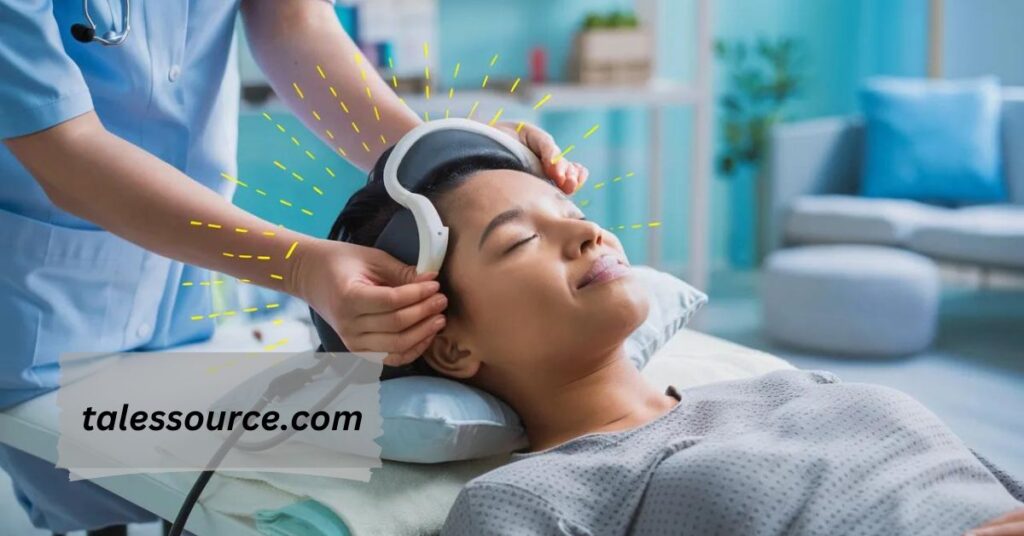TMS Treatment for APN – A Revolutionary Approach to Managing Anxiety and Panic Neurosis!

Anxiety and Panic Neurosis (APN) is a mental health condition that significantly impacts the lives of those affected, causing symptoms that can range from persistent worry to sudden, overwhelming panic attacks. Traditional treatments, such as medications and psychotherapy, have been the standard approach for managing APN.
However, these treatments are not always effective for everyone, leading to the exploration of alternative therapies like Transcranial Magnetic Stimulation (TMS). This article delves into the details of TMS treatment for APN, highlighting its potential benefits, the science behind it, and its growing role in modern mental health care.
What is APN (Anxiety and Panic Neurosis)?
- Persistent fear or worry
- Feelings of impending doom
- Physical symptoms like heart palpitations, shortness of breath, and dizziness
- Avoidance of certain situations due to fear of a panic attack
Traditional Treatments for APN:
- Medication: Antidepressants, benzodiazepines, and beta-blockers are often prescribed to manage symptoms. These medications can help reduce the frequency and severity of anxiety and panic attacks but may come with side effects and are not always effective for everyone.
- Psychotherapy: Cognitive Behavioural Therapy (CBT) is the most common form of psychotherapy used to treat APN. CBT helps patients identify and change negative thought patterns that contribute to their anxiety. While effective, it requires time and commitment, and not all patients respond to it.
Understanding TMS (Transcranial Magnetic Stimulation):
Transcranial Magnetic Stimulation (TMS) is a non-invasive procedure that uses magnetic fields to stimulate nerve cells in the brain. TMS has been primarily used to treat depression, particularly in cases where patients have not responded to other treatments. However, its potential for treating APN is now being recognized.
1. How TMS Works?
TMS involves placing a coil on the scalp that delivers magnetic pulses to specific areas of the brain. These pulses stimulate the brain cells and can help improve communication between different regions of the brain, potentially alleviating symptoms of anxiety and panic TMS Treatment for APN.
2. The Science Behind TMS for APN:
Research has shown that certain areas of the brain, such as the prefrontal cortex, are involved in regulating mood and anxiety. TMS targets these areas, helping to modulate activity and reduce symptoms. By influencing the brain’s neural networks, TMS can help restore balance in individuals with APN.
The Benefits of TMS for APN:
- Non-Invasive: Unlike other treatments, TMS does not require surgery or medication, making it a less invasive option with fewer side effects.
- Targeted Treatment: TMS allows for precise targeting of specific areas of the brain, which can lead to more effective treatment outcomes.
- Minimal Side Effects: TMS is generally well-tolerated, with the most common side effect being mild headaches. Unlike medications, it does not have systemic side effects.
- Potential for Long-Term Relief: Some studies suggest that TMS may provide long-lasting relief from anxiety and panic symptoms, reducing the need for ongoing treatment.
The Procedure: What to Expect
- Initial Consultation: A thorough evaluation by a mental health professional will determine if TMS is appropriate for you. This may involve a psychiatric assessment, a review of your medical history, and discussions about your treatment goals.
- Treatment Sessions: TMS treatment typically involves a series of sessions, usually five days a week for several weeks. Each session lasts about 30-40 minutes, during which you will sit comfortably while the TMS coil is placed on your scalp.
- Monitoring and Adjustments: Throughout the treatment, your response will be closely monitored. The intensity and location of the magnetic pulses may be adjusted to optimize results.
- Post-Treatment: After completing the course of TMS therapy, your progress will be evaluated. Some patients may require additional sessions or maintenance treatments to sustain the benefits.
The Growing Role of TMS in Mental Health Care:
As research continues to explore the potential of TMS, its role in treating mental health conditions like APN is expanding. TMS is now recognized as a valuable tool in the arsenal of mental health treatments, particularly for those who have not found relief with traditional therapies TMS Treatment for APN.
Comparing TMS with Other Treatments:
- Medication vs. TMS: Medications are often the first line of treatment for APN, but they come with the risk of side effects and may not be effective for everyone. TMS offers a non-invasive alternative with fewer side effects, making it an attractive option for those who cannot tolerate or do not respond to medications.
- Psychotherapy vs. TMS: Psychotherapy, particularly CBT, is highly effective for many individuals with APN. However, it requires active participation and may not work for everyone. TMS provides a different approach by directly targeting brain activity, which can complement or serve as an alternative to psychotherapy.
- Combination Therapy: For some patients, a combination of TMS with medication or psychotherapy may offer the best outcomes. This integrated approach allows for a more personalized treatment plan.
Challenges and Considerations:
- Accessibility: TMS is not yet widely available, and access may be limited depending on your location. Additionally, insurance coverage for TMS varies, which can impact affordability.
- Individual Variability: Not everyone responds to TMS in the same way. Factors such as the severity of symptoms, underlying health conditions, and the specific protocol used can influence outcomes.
- Ongoing Research: TMS for APN is still an emerging field, and ongoing research is needed to fully understand its long-term effectiveness and potential applications.
Conclusion:
TMS represents a promising option for those struggling with APN, particularly when traditional treatments have failed. Its non-invasive nature, targeted approach, and minimal side effects make it an appealing alternative or complement to existing therapies. However, it’s important to consult with a mental health professional to determine if TMS is the right choice for you.
FAQ’s:
1. What is TMS treatment for APN?
TMS treatment for APN involves using magnetic pulses to stimulate specific areas of the brain that regulate mood and anxiety, offering a non-invasive alternative to traditional treatments TMS Treatment for APN.
2. How effective is TMS for treating APN?
While TMS has shown promising results in treating APN, its effectiveness can vary from person to person. Some patients experience significant relief, while others may see more modest improvements TMS Treatment for APN.
3. Are there any side effects of TMS?
The most common side effects of TMS are mild headaches and discomfort at the treatment site. Unlike medications, TMS does not have systemic side effects TMS Treatment for APN.
4. How long does TMS treatment last?
A typical course of TMS treatment involves daily sessions for 4-6 weeks. Each session lasts about 30-40 minutes TMS Treatment for APN.
5. Is TMS covered by insurance?
Insurance coverage for TMS varies, with some plans covering the treatment for certain conditions like depression. Coverage for APN may be more limited, so it’s important to check with your provider TMS Treatment for APN.
6. Can TMS be combined with other treatments?
Yes, TMS can be combined with medication and psychotherapy to enhance treatment outcomes. This combination approach can be particularly effective for some patients TMS Treatment for APN.
7. What should I expect during a TMS session?
During a TMS session, you’ll sit comfortably while a coil is placed on your scalp. The coil delivers magnetic pulses to targeted areas of your brain. The procedure is non-invasive and generally well-tolerated TMS Treatment for APN.
8. How quickly will I see results from TMS?
Some patients may start to see improvements within a few weeks of starting TMS treatment, while others may take longer. The full benefits of TMS may not be apparent until after the entire course of treatment is completed TMS Treatment for APN.
9. Is TMS a permanent solution for APN?
While TMS can provide long-lasting relief, it may not be a permanent cure for APN. Some patients may require maintenance sessions to sustain the benefits TMS Treatment for APN.
10. Who is a good candidate for TMS treatment?
TMS may be a good option for individuals with APN who have not responded to traditional treatments like medication and psychotherapy. A thorough evaluation by a mental health professional is necessary to determine eligibility TMS Treatment for APN.





